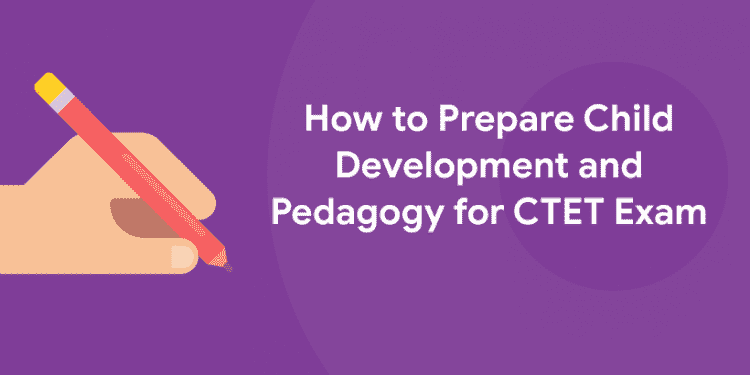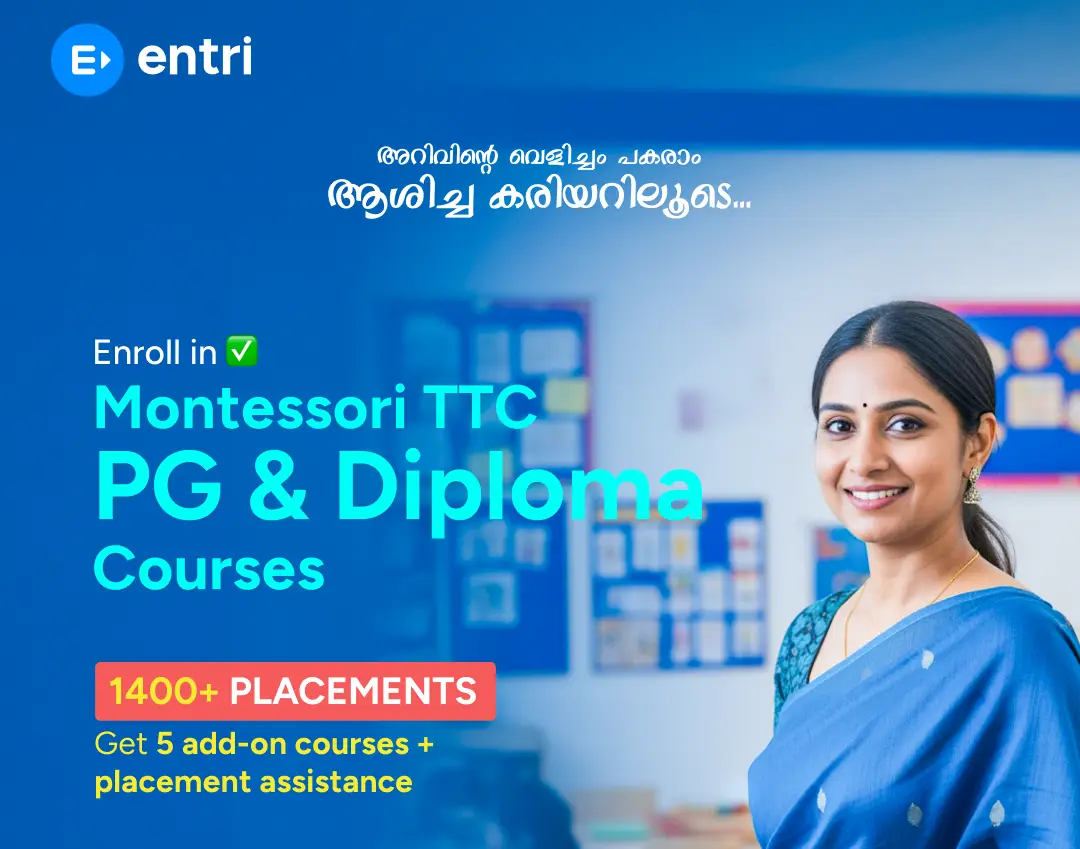Table of Contents
CTET or Teacher Eligibility Test is an entrance examination to recruit teachers in government schools from Class 1 to Class 8 across India. This exam is based on the National Curriculum Network framework, which is created for proposing changes & updates to the NCTE (National Council for Teacher Education). Candidates, who possess the professional qualifications such as B.T.C. (D.El.Ed), B.Ed., and B.El.Ed., are eligible to take this test. A candidate must attain at least 60% marks to qualify for the CTET exam. In this blog, we will discuss some tips on how to prepare for Child Development and Pedagogy for CTET Exam.
Download Entri app and take a free mock test now
CTET Paper-I and Paper-II exams have the following five subjects. Most of the subjects are common in both papers. These subjects are as follow –
- Child Development & Pedagogy
- Language-I
- Language-II
- Mathematics
- Environmental Studies (Social Studies / Social Sciences in case of Paper-II)
Click here to find the detailed notification for CTET 2020
CTET Exam Preparation: Child Development
Before heading to the study, you should prepare some plans & perform related activities. In addition to this, you must check that all of them are finished appropriately.
Understand the syllabus
Be thorough with the entire syllabus. This will help you divide the preparation time for each topic based on your comfort. There can be some topics, which are correlated with each other. Hence, you have to prepare a list of such topics comprising the priorities for studying. It is advised to prepare the correlated topics first and then move on to the difficult topics.
Analyze the question
It is also a very important activity during the preparation of all the competitive exams including the CTET exam as well. Under this activity, you have to analyze the previous year’s papers and prepare a list containing the name of topics and the number of asked questions out of these topics. Hence, you will get an idea about the topics out of which maximum and minimum questions are asked. This is also the best method for deciding the priorities of the topics during the CTET preparation.
Preparing a study plan after combining this approach with the outcomes of the syllabus analysis phase can give you a positive result in the CTET exam and it will certainly help you in optimizing your efforts during the preparation phase as well.
Important Topics
Before implementing the designed study plan, you should also prepare notes on the most frequently asked concepts or theories, which will help you in identifying the important concepts. This list will also help you in revising the pre-visited concepts/ theories as well. There are several theories and concepts, which are generally asked in the CTET exam. Few of them are as follows-
| Theory topics | Classification |
| Theories/Concepts of Intelligence | Binet’s unifactor theory |
| Spearman’s two-factor theory | |
| Stenberg’s triarchic theory | |
| Gardener’s theories of multiple intelligences | |
| Gulliford’s structure of intellect theory | |
| Child Development Theories | Piaget’s Theory of cognitive development |
| Kohlberg’s theory of moral development | |
| Chomsky’s theory of linguistic development | |
| Vygotsky’s theory of socio-cultural development | |
| Learning theories | Pavlov’s theory of classical conditioning |
| Thorndike’s theory of connectionism | |
| Gestalt learning | |
| Maslow’s theory of needs | |
| Tolman’s theory of signal learning | |
| Bandura’s theory of social learning | |
| Skinner’s theory of operant conditioning | |
| Intelligence testing theories | Stanford Binet IQ testing |
| Bayley’s intelligence scale | |
| Raven’s progressive matrices test | |
| Wechsler Adult intelligence scale | |
| Assessment & Evaluation theories | Assessment for learning |
| Assessment of learning | |
| Assessment as learning |
PEDAGOGYThrough this methodology, you can efficiently cover all the important concepts and score good marks in the CTET exam. You can expand this list for the rest concepts and theories as well.
Pedagogy is the art, science, and craft of teaching where you accompany learners, care for them and bring the concept of learning to live.
In the CTET exam, child development & pedagogy is a separate section. But, the syllabus of Child development is different from the pedagogy. The Pedagogy as a subject contains the following topics-
- How children think and learn; how and why children ‘fail’ to achieve success in school performance.
- Basic processes of teaching and learning; children’s strategies of learning; learning as a social activity; social context of learning.
- Child as a problem solver and a ‘scientific investigator’
- Alternative conceptions of learning in children, understanding children’s ‘errors’ as significant steps in the learning process.
- Cognition & Emotions
- Motivation and learning
- Factors contributing to learning – personal & environmental
CTET Exam Preparation Tips: Pedagogy
Preparing for pedagogy is very simple and pragmatic. Pedagogy focuses on the growth of learners (How learner grasps things). Adhering to the following tips, you can surely ace this section in the exam.
Child characteristics
Pedagogy is all about understanding the learner’s characteristics. Reading too many books cannot help you in attempting the pedagogy’s questions correctly. For this, you should analyze the following things initially by putting yourself into the learner/child’s shoes-
– What is the thought & learning process of a child?
– What are the constraints in a child’s learning?
– What motivates and demotivates a child?
– What are the factors that are responsible for a child’s personal development? and so on.
To find the answers to such questions, you should perform the Gap analysis and 5 W’s (what, why, when, where, and who) & 1 H (How) analysis. Seeking the answers to such questions at your own efforts and intuition will make you feel confident. With such an analysis, you can answer most of the questions very easily in the CTET exam. Hence, understanding a child is a very important and mandatory step during the preparation of the pedagogy section.
Pedagogical Approaches & Considerations
To qualify CTET exam, you must be familiar with the several pedagogical approaches & considerations, which are used for teaching a child effectively. These approaches & considerations focus on child motivation, their attention, and the removal of the learning barriers. Few widely exercised pedagogical approaches & considerations are given below-
| Pedagogical Approaches | Pedagogical Considerations |
| Student-centered learning | Learning space |
| Dialogic learning | Learning theories |
| Critical pedagogy | Learning mode (Distance, online, etc.) |
Hence, you must have detailed knowledge of the above-stated topics because all questions in this section are framed around these approaches & considerations.
Reading research papers
As a teacher or as a CTET aspirant, you must develop a habit of reading various research papers on pedagogy & related subjects. These papers will definitely prove helpful in the CTET exam and in the future teaching assignments as well. Research papers on this section focus on effective pedagogies. Please find the websites where you can find the relevant research papers to study on pedagogy-
CTET Child Development & Pedagogy Weightage
- Child Development and Pedagogy is a common subject in both Paper-I and Paper-II.
- It consists of 30 marks out of 150 marks in both papers which means it carries 20% weightage in both papers.
- Theoretical questions are asked from this subject.
- The difficulty level of the questions is easy to moderate.
CTET Child Development & Pedagogy Important Topics
- Theories of Intelligence
- Theories of Child Development
- Learning theories
- Intelligence theories
- Assessment & Evaluation
- Concepts of Psychology
Child Development and Pedagogy Important Questions with Answers
- The most critical period of acquisition and development of language is
(1) pre-natal period.
(2) early childhood.
(3) middle childhood.
(4) adolescence.Ans: 2 - During classroom discussions, a teacher often pays more attention to
boys than girls. This is an example of
(1) Gender bias.
(2) Gender identity.
(3) Gender relevance.
(4) Gender constancyAns: 1 - Which of the following theorists while viewing children as active seekers of
knowledge emphasized the influence of social and cultural contents on their
thinking?
(1) John B. Watson
(2) Lev Vygotsky
(3) Jean Piaget
(4) Lawrence Kohlberg Ans: 2 - Giving cues to children and offering support as and when needed is an example of
(1) reinforcement.
(2) conditioning.
(3) modeling.
(4) scaffolding.
Ans: 4 - Which of the following is a Piagetian construct in the context of the cognitive development of children?
(1) Schemas
(2) Observational learning
(3) Conditioning
(4) ReinforcementAns: 1 - Children’s errors and misconceptions
(1) signify that children’s capabilities are far inferior to that of adults.
(2) are a significant step in the teaching-learning process.
(3) are a hindrance and obstacle to the teaching-learning process.
(4) should be ignored in the texting learning process.Ans: 2 - In the constructivist frame, the child is viewed as
(1) a ‘problem solver’ and a ‘scientific investigator’.
(2) ‘miniature adult’ who is less than an adult in all aspects such as size, cognition, emotions.
(3) ‘tabula rasa’ or ‘blank slate’ whose life is shaped entirely by experience.
(4) a ‘passive being’ who can shape and mold into any form through conditioning.Ans: 1 - According to Lev Vygotsky, mental, basic mental capacities are transformed into higher cognitive
processes primarily through.
(1) adaptation and organization
(2) rewards and punishment
(3) social interaction
(4) stimulus-response associationAns: 3 - Which of the following statements denotes the relationship between development and learning
correctly?
(1) Development and learning are inter-related and inter-dependent.
(2) Development and learning are not related.
(3) Learning takes place irrespective of development.
(4) The rate of learning far exceeds the rate of development.Ans: 1 - Selecting and presenting stories and clippings from a newspaper that portray both men and
women in non-traditional roles is an effective strategy to
(1) counter gender stereotypes
(2) promote gender bias
(3) promote gender constancy
(4) stereotypical gender rolesAns: 1
We provide you with the best set of faculties and the most valid study materials. Let’s crack this together! All the best to all the aspirants. Keep practicing until you achieve your dream and remain calm and confident during the entire selection process. Entri team wishes you the best of luck!











